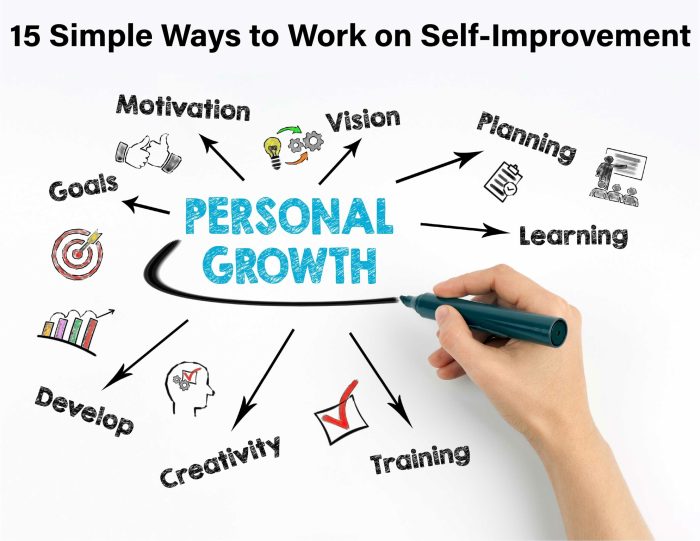Self-Improvement Tips sets the stage for this enthralling narrative, offering readers a glimpse into a story that is rich in detail with American high school hip style and brimming with originality from the outset.
Get ready to dive into the world of personal growth and development as we explore practical tips and tricks to enhance your journey towards becoming the best version of yourself.
Importance of Self-Improvement
Self-improvement is crucial for personal growth as it allows individuals to enhance their skills, knowledge, and mindset. By continuously working on oneself, people can strive to become the best version of themselves and achieve their goals.
Positive Impact of Self-Improvement
- Improved Mental Health: Engaging in self-improvement practices such as mindfulness, therapy, or self-reflection can lead to reduced stress, anxiety, and depression.
- Enhanced Relationships: By working on communication skills, empathy, and emotional intelligence, individuals can build stronger connections with others and have healthier interactions.
- Career Advancement: Developing new skills, staying updated with industry trends, and setting ambitious goals through self-improvement can lead to professional success and job satisfaction.
Key Benefits of Self-Improvement
- Increased Self-Confidence: Setting and achieving personal goals can boost self-esteem and confidence levels.
- Adaptability: Continuous self-improvement helps individuals adapt to change, challenges, and new opportunities more effectively.
- Personal Fulfillment: The journey of self-improvement can bring a sense of accomplishment, purpose, and satisfaction in life.
Setting Realistic Goals

Setting realistic goals is crucial for self-improvement as it provides a clear direction and motivation to work towards personal growth. Unrealistic goals can lead to frustration and demotivation, while achievable goals can boost confidence and drive progress.
Tips for Setting SMART Goals
- Specific: Clearly define your goal. Instead of saying “I want to get in shape,” specify “I will go to the gym three times a week.”
- Measurable: Make sure you can track your progress. For example, set a goal to lose 5 pounds in a month.
- Achievable: Set goals that are challenging but within reach. Don’t aim to run a marathon next month if you’ve never run before.
- Relevant: Ensure your goals align with your values and long-term objectives. Focus on what truly matters to you.
- Time-bound: Set a deadline for your goal to create a sense of urgency and prevent procrastination.
Examples of Realistic Goals
Setting realistic goals can lead to sustainable self-improvement by breaking down big aspirations into manageable steps. For instance, instead of saying “I want to read more books,” a SMART goal could be “I will read two books per month for the next six months.” This specific, measurable, achievable, relevant, and time-bound goal provides a clear roadmap for success and helps track progress effectively.
Developing Healthy Habits
Developing healthy habits plays a crucial role in self-improvement as it helps individuals maintain physical, mental, and emotional well-being. By incorporating positive behaviors into daily routines, individuals can enhance their overall quality of life and achieve personal growth.
Examples of Healthy Habits
- Regular exercise: Engaging in physical activity not only improves physical health but also boosts mood and reduces stress.
- Healthy eating: Consuming a balanced diet rich in nutrients supports overall health and well-being.
- Practicing mindfulness: Taking time to be present in the moment and focus on thoughts and feelings can reduce anxiety and improve mental clarity.
- Sleep hygiene: Prioritizing quality sleep by maintaining a consistent sleep schedule and creating a restful environment promotes optimal cognitive function and emotional stability.
Strategies for Building and Maintaining Positive Habits
- Start small: Begin by incorporating one healthy habit at a time to avoid feeling overwhelmed.
- Set specific goals: Clearly define the habit you want to develop and establish measurable objectives to track progress.
- Stay consistent: Make a commitment to practice the habit daily and create reminders or routines to reinforce it.
- Seek support: Share your goals with friends or family members who can provide encouragement and hold you accountable.
Embracing Continuous Learning: Self-Improvement Tips

In the journey of self-improvement, embracing continuous learning plays a crucial role in personal growth and development. Lifelong learning enables individuals to adapt to new challenges, expand their knowledge, and enhance their skills in various aspects of life.
The Significance of Lifelong Learning
Continuous learning fosters a growth mindset, allowing individuals to remain open to new ideas, perspectives, and opportunities for self-improvement. It encourages personal development by challenging individuals to step out of their comfort zones and acquire new knowledge and skills.
Methods to Cultivate a Growth Mindset for Continuous Learning, Self-Improvement Tips
- Embrace challenges and see them as opportunities for growth.
- View failures as learning experiences and opportunities to improve.
- Seek feedback and constructive criticism to enhance self-awareness and identify areas for improvement.
- Set learning goals and actively seek out opportunities to acquire new knowledge and skills.
Enhancing Personal Development through Learning New Skills and Knowledge
Learning new skills and knowledge opens doors to personal growth and development by expanding one’s capabilities and increasing opportunities for success. It enables individuals to stay relevant in a rapidly changing world, adapt to new technologies, and pursue their passions and interests.






